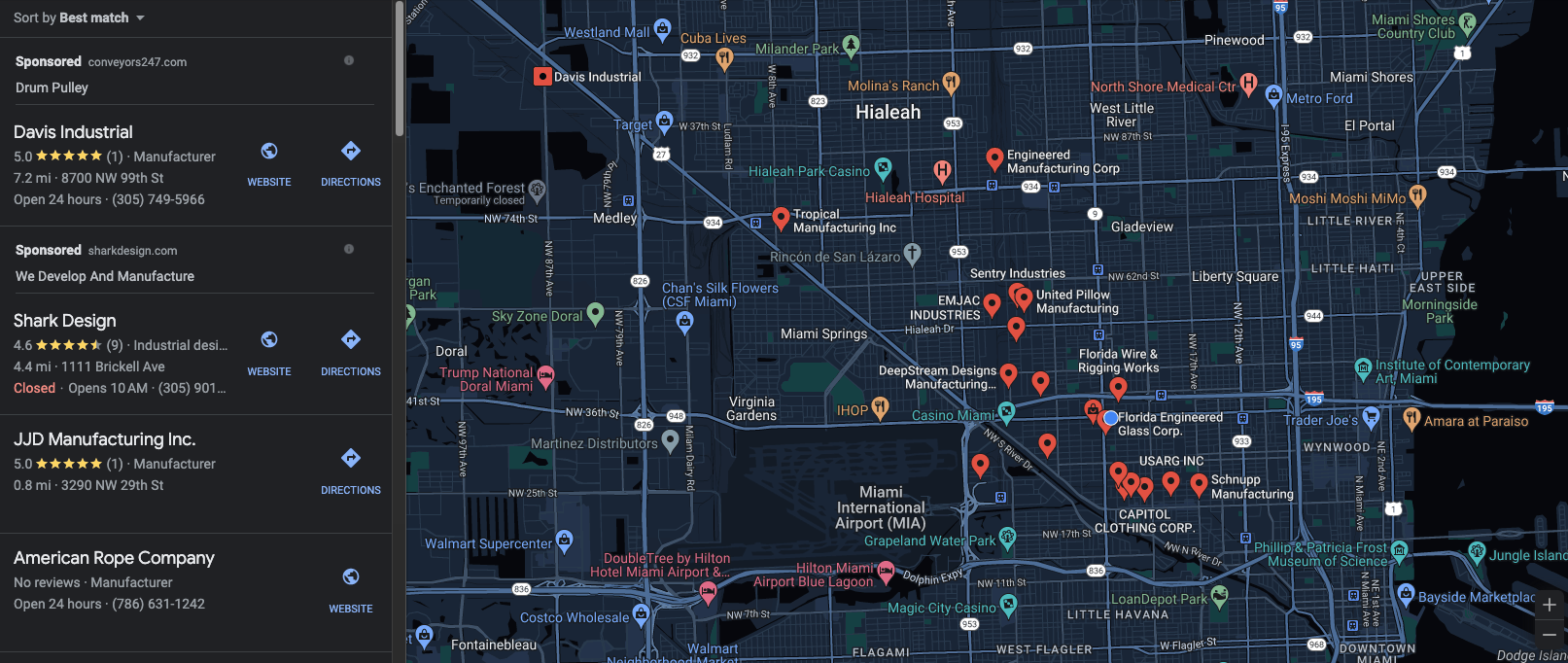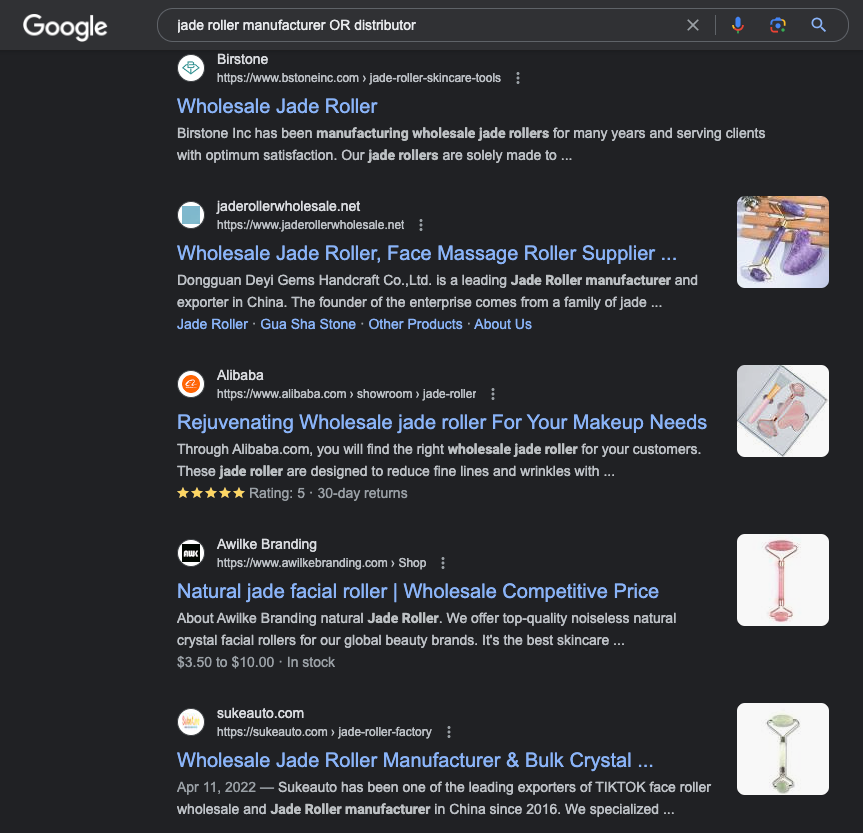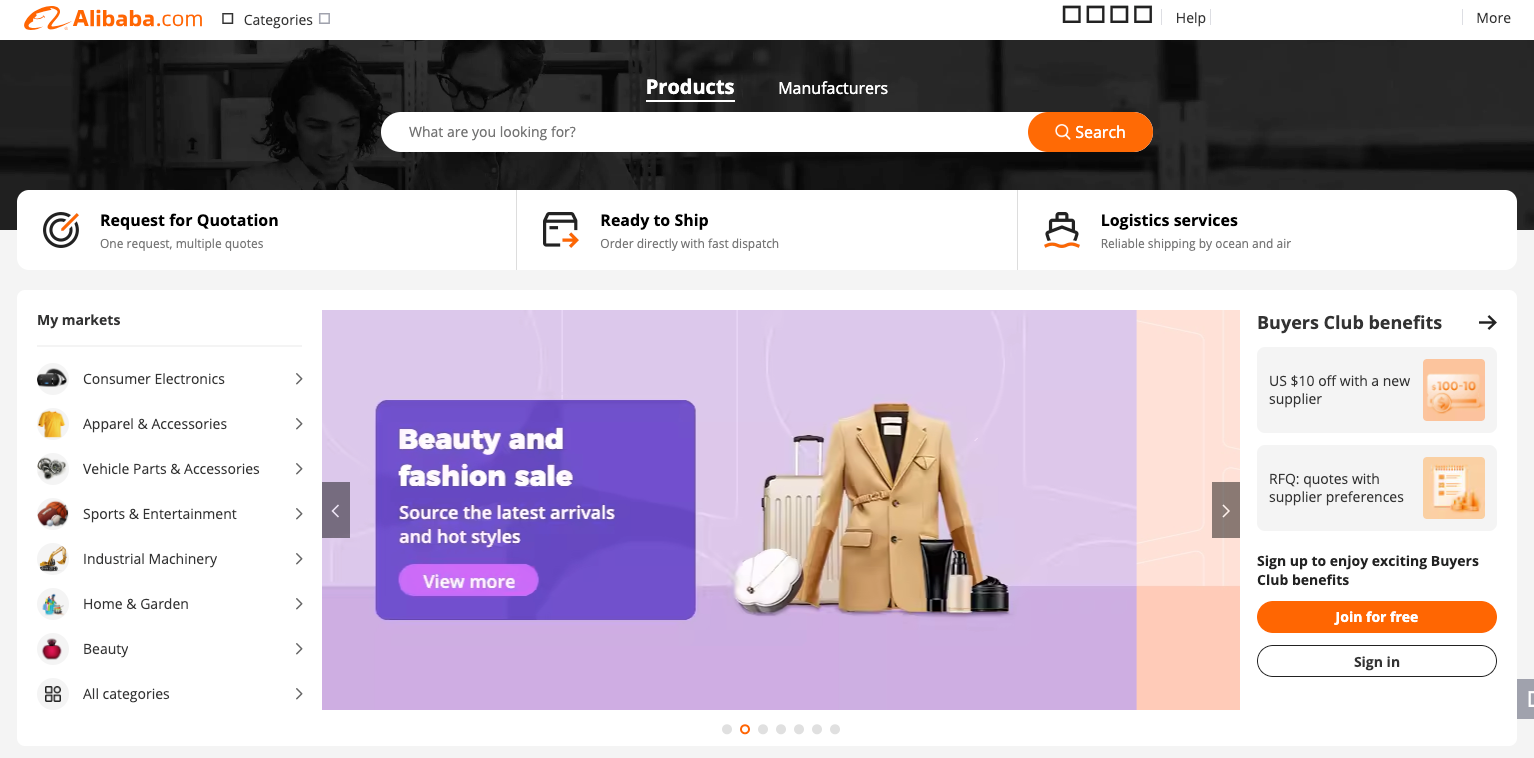Our view at Stack - Shopify has just about everything you need if you're looking to sell online. It excels with unlimited products, user-friendly setup, and 24/7 support. It offers 6,000+ app integrations, abandoned cart recovery, and shipping discounts up to 88%. Plus, it allows selling both online and in-person, scaling as your business grows.
Entrepreneurs can find themselves hitting a brick wall when it comes to sourcing products. Whether you plan to manufacture something of your own or find suppliers to purchase from wholesale, good products aren’t always easy to identify.
Sourcing a supplier for your next project includes finding a manufacturer, deciding whether it’s better to work with manufacturers near you or abroad, and evaluating if a manufacturer is legitimate. It’s also essential to ask suppliers certain questions when developing a product for your ecommerce business.
What is a manufacturer?
A manufacturer is any business that produces finished goods from raw materials. They sell these goods to consumers, wholesalers, distributors, retailers, and other manufacturers wanting to create more complex items.
Manufacturers typically stick to one type of product. For example, you could work with a glassware manufacturer who creates glass bottles and jars. You could work with one manufacturer for cardboard boxes and another for plastic or natural products.
Retailers often work with multiple manufacturers at once to create an inventory for their store.
Is a manufacturer a supplier?
Suppliers refer to anyone who can provide you with products and inventory. This encompasses manufacturers, wholesalers, and distributors.
There are a ton of helpful resources online that you can find through Google. But before you begin, there are a few things you need to know and decide.
You should figure out what type of supplier you’re looking for, which could depend on your ecommerce business model. This will help determine the terminology you need to use in your research. There are several supplier options, the most common being:
- A manufacturer that produces your product idea
- A supplier (who may also be a manufacturer), wholesaler, or distributor who purchases already-existing brands and products
- A dropshipping company that supplies products and fulfills orders of already-existing brands and products
Domestic vs. overseas suppliers
If you plan to manufacture or wholesale, when looking for suppliers you’ll need to decide whether you want to source domestically or from abroad.
It’s a good idea to secure two manufacturers: one domestic and one foreign. Your local manufacturer can be used as a backup. If international orders are late or incorrect, you can fall back on your local supplier. Domestic suppliers are often more expensive, but it’s better to keep products stocked and customers happy instead of waiting for delayed shipments.
It’s often cheaper to source your products overseas, especially in Asian countries, like India, China, and Vietnam, which ranked as the three countries with the cheapest manufacturing costs, according to U.S. News & World Report.
How to find a manufacturer in 6 steps
Manufacturers can make your product ideas a reality. Follow these six steps to find the best manufacturers and suppliers for your business.
- Research your options
- Outreach and collect information
- Communicate your designs
- Order samples and compare
- Negotiate
- Place your order
1. Research your options
Finding the right manufacturer for your product is crucial to your success. Manufacturers can play a role in determining your product’s cost, quality, packaging, and shipping. You can use tools to help you find suppliers:
To find manufacturers near you, do a Google search for “manufacturers near me.” Check out their websites, customer reviews, and product specialties.

Many suppliers’ websites are old, sparse on information, and have poor search engine optimization. This means you may have to use a variety of search terms to find what you’re looking for. For example, words such as “wholesale,” “supplier,” and “distributor” may be used interchangeably, so you should search for all of them.
Make yourself familiar with Google’s advanced search features to improve the quality of your results.

Referrals
Some of the best leads can come from referrals. Ask your professional networks if they have supplier recommendations or if they know someone who might. Look for individuals who’ve found success in an area you’d like to pursue and see if they’re willing to share their contacts. Join Facebook groups and other online ecommerce communities to see if there are helpful reviews.
Even if a supplier isn’t the right fit for you, ask them if they can point you in the right direction. Being in the industry means they’ll likely have contacts to refer you to that could be better fits.
NAICS codes
Another way to look for product suppliers is searching for your products by their code in the North American Industry Classification System (NAICS).
The NAICS classifies manufacturers and products with codes, making some manufacturers and suppliers easier to find, especially in professional directories. Here’s the link for the United States’ NAICS code and the link for Canada’s NAICS code.
You’ll need to vet your potential manufacturer. Once you’ve narrowed it down to a few possibilities, continue your research to make sure they’re credible. Check the Better Business Bureau (BBB) to see if there have been any complaints filed and browse the manufacturer’s customer reviews.
Alibaba
Alibaba connects you with manufacturers from China. It’s a popular marketplace to find existing products, but you can also use Alibaba to connect with manufacturers to create custom products. Search for the products you’re looking for and browse through the various suppliers and manufacturers.

It’s easy to safely buy from Alibaba. The marketplace lets you vet manufacturers upfront to get the best products at a fair price. When researching manufacturers on Alibaba, make sure they have the following qualifications:
- Gold supplier, which means they pay for their Alibaba membership.
- Verified, which means a third-party evaluation services company or Alibaba has visited their manufacturing facility.
- Trade assurance, a free service that protects your orders from payment to delivery.
You can continue to search by applying filters. You can sort by certifications (such as SA8000, which ensures humane working conditions) to find a manufacturer that aligns with your business values.
You can also make sure your manufacturer is not a trading company. A trading company is a liaison and won’t be able to produce your products.
Directories
Another place to research manufacturers is in an online supplier directory. These directories act as manufacturer catalogs that contain profiles for thousands of manufacturers, wholesalers, and suppliers. A few of the most popular ones for domestic and international suppliers are:
Online domestic directories
Online overseas directories
2. Conduct outreach and collect information
Once you’ve got a few manufacturers on your radar, you’ll want to get quotes. Aim to get a minimum of three quotes to compare options. For local manufacturers, you can also reach out to organize a tour of their facility or a visit to their office.
In addition to pricing information, you’ll want answers to the following questions:
- Can they accommodate custom orders? Assess if the supplier or equipment manufacturer can create the product you want. Do they have the skills and resources? Do they have automation features?
- What are their lead times? How long will it take to produce and ship items? You don’t want to work with manufacturers who take three months to deliver your products. If a product goes out of stock, you don’t want to leave customers waiting to receive their orders.
- What are shipping costs? Shipping makes up a massive portion of small business expenses. Learn a manufacturer’s shipping costs to determine how it’ll affect your bottom line.
- What are their minimum order quantities (MOQs)? Don’t lead with this question, because it might deter manufacturers from working with you. However, you’ll want to know the minimum amount of items you have to order before they start producing your product. This is often negotiable.
- What is the cost per unit? While you’re negotiating MOQs, you’ll also want to negotiate cost per unit. The larger the order, the lower your cost per unit can be.
- Can they grant you exclusivity? If there’s tooling involved (i.e., you buying a tool for them to manufacture your product), make sure they aren’t allowing others to use it. You can also ask for territorial, market, or total exclusivity. Some service providers may even offer private label goods.
- Are there setup fees involved? Sometimes manufacturers will charge a fee to get equipment ready to produce your goods.
- What’s their defect policy? Find out who eats the cost for incorrect or defective items. Who pays for the shipping and duties?
- Is the manufacturer sustainable and ethical? Find out about the factory conditions, and see how they impact the environment and those who work there.
Negotiating minimum order quantities
If you’re looking for a supplier for the first time, you’re going to quickly learn about MOQs. It’s not uncommon for a manufacturer to require a commitment to purchase hundreds or even thousands of units for your first order, depending on the product and manufacturer.
MOQs make it difficult when you have limited funds or want to start small and test the market before making larger purchases. MOQs are almost always negotiable.
Before you negotiate, understand why the supplier has imposed a minimum. Is it because there’s a lot of work upfront? Is it because they prefer to work with larger buyers? Understanding the reasons for the minimum will help you better understand their position and allow you to negotiate and propose the best counter offer.
Discussing payment terms
Many suppliers will require new businesses to pay for a full order upfront. This is important to know, since inventory is a major cost for ecommerce businesses. You should also ask if they provide payment terms on future orders.
Suppliers get bombarded with email quote requests all the time from flaky buyers, so it’s not unusual for suppliers to ignore your request. Suppliers’ lack of responsiveness is a common complaint from new ecommerce entrepreneurs.
So how do you ensure you’re not ignored? There are a few things you should do when you reach out to suppliers for the first time:
- Focused emails. Your first email to a manufacturer should be clear and concise. Avoid telling too much about your story and background. The first email should purely assess potential fit at a high level. Focus on what suppliers care about the most, like the details of what you’re trying to source.
- Asking for what you need. Requests aren’t always easy for the supplier to satisfy. It’s important to ask about pricing for multiple quantities, but avoid asking for too much or too many quotes. Stick to what you absolutely need to know to assess fit between you and the supplier.
- Prepare. If you’re unsure about your request, consider giving the supplier a call or send a one-question email. For example, you might want to know the supplier’s minimum order because if you ask for a quote that’s well below their minimum order, you might not receive a response.
Many good manufacturing suppliers will be open to negotiating payment terms. One payment strategy you could propose would be to pay for 50% upfront and 50% after you receive the shipment. This holds both parties responsible for the order and doesn’t leave too much risk on either side.
Communicating with manufacturers and suppliers
Chances are you won’t use a manufacturing manager when starting your online business. You’ll have to communicate with suppliers on your own. You can do this via phone, email, or text. When working with local manufacturers, you can also do in-person meetings.
Look for companies that are responsive and eager to work with you. If someone is slow to respond to emails and send samples, you may not want to trust them with your business.
3. Communicate your designs
Once you talk with a potential manufacturer, ask if they can create your design. Some manufacturers have a product development process with prototyping and 3D modeling—but it can get expensive.
As an alternative, communicate your ideas with them through:
- Sketches
- Instructions
- Reference photos
If they don’t do design, you can use Fiverr or Upwork to find freelancers to create drawings for you. Look to hire:
- Indstrustial designers
- Product designers
- Computer-aided design (CAD) experts
Another option is finding a local designer. You can work with them to develop prototypes and custom molds. It could be more affordable than going through a manufacturer.
4. Order samples and compare
Get samples to test before going into production. Once the sample is to your standard, you should date and sign the sample. Save one or two for yourself. These are called your control samples: forensic samples used to assure quality and get consistent consumer products.
For example, you open a package from a manufacturer and find your products’ colors are completely wrong. You can reference the control sample to indicate the products you received are not what was previously agreed upon.
5. Negotiate
Between the time you get a sample and when you place your order, it’s still possible to negotiate terms on payment or MOQ. When negotiating, put yourself in the manufacturer’s shoes. The goal isn’t to exploit your manufacturing partner to get the best price. It’s to work together so both parties profit and are happy. It’s the only way to build a long-term, healthy relationship.
6. Place your order
After completing a quality control check to make sure every product meets your standards, you can place your order and get the production process started.
Moving forward with your supply partners
Sourcing suppliers and manufacturers is one of the costs of starting a business. Partnering with suppliers that are good fits is a critical decision for your new business, and they aren’t always easy to find.
It’s easy to get frustrated when you hit dead ends or brick walls, but in most cases, it just requires a little more patience and perseverance to find the perfect partner for your new venture.
Illustration by Pete Ryan
How to find a manufacturer FAQ
What does manufacturing mean?
What are the types of manufacturing?
- 3D printing
- Repetitive manufacturing
- Discrete manufacturing
- Job shop manufacturing
- Continuous process
- Batch process
What is an example of manufacturing?
How do I find a manufacturer?
- Alibaba
- Free online directories
- Referrals
- NAICS codes
If Shopify is of interest and you'd like more information, please do make contact or take a look in more detail here.
Credit: Original article published here.
